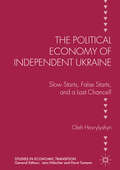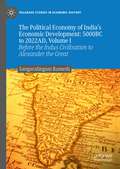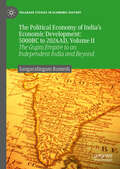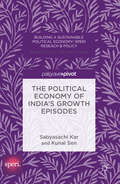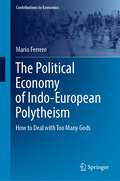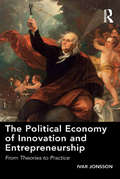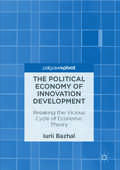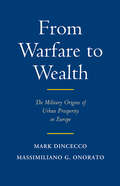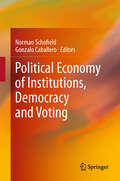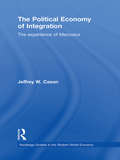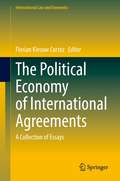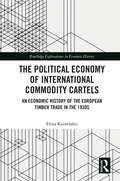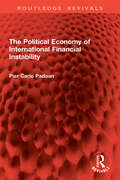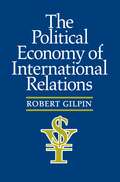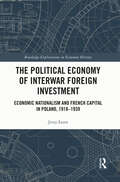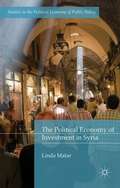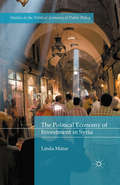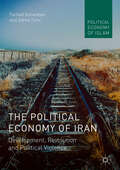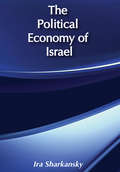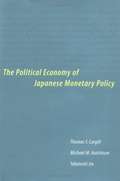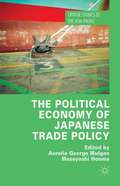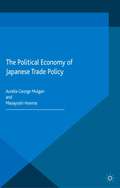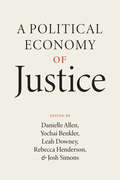- Table View
- List View
The Political Economy of Independent Ukraine
by Oleh HavrylyshynMarking the 25th anniversary of Ukraine as a sovereign nation, this book traces its economic transformation since 1991. Post-communist transition has been a highlight of recent history, and Ukraine stands out as one of its most interesting and puzzling cases. Havrylyshyn offers the first comprehensive treatise on the entire period, providing a thorough description of the slow evolution of economic reforms, exploring how and why performance in this regard fell far behind the leaders in transition. Testing several conventional hypotheses, the author argues that while Russian imperialism may form part of the explanation, the self-serving interests of domestic elites and new oligarchs may be even more important. Radically revising the traditional argument that reforms were delayed to allow nation building, this book contends that it was due more to the interests of the non-lustrated elite, who needed time to become the new capitalists.
The Political Economy of India's Economic Development: Before the Indus Civilisation to Alexander the Great (Palgrave Studies in Economic History)
by Sangaralingam RameshThis book, the first of two volumes, explores India’s economic development from 5000BC through to the India’s independence period from 1947AD to 2022AD. The specific characteristics of economic development in India are examined to help determine development paths India can pursue to create sustainable development in the 21st century. The transition from the primary section to the secondary sector, through the process of industrialisation and in turn the move towards the services sector, is discussed in relation to climate change and the pressure on resources posed by population growth.This book aims to contextualise India’s economic development within the political economy of trade, sustainable development and culture with a particular focus on the institutions that have emerged in the Indian sub-continent since 5000BC. It will be relevant to students and researchers interested in economic history, development economics, and the political economy.
The Political Economy of India’s Economic Development: The Gupta Empire to an Independent India and Beyond (Palgrave Studies in Economic History)
by Sangaralingam RameshThis book, the second of two volumes, explores India’s economic development from the Gupta Empire (400AD) through to modern day India. The specific characteristics of economic development in India are examined to help determine development paths India can pursue to create sustainable development in the 21st century. The transition from the primary section to the secondary sector, through the process of industrialisation and in turn the move towards the services sector, is discussed in relation to climate change, technological innovation, and the pressure on resources posed by population growth. This book aims to contextualise India’s economic development within the political economy of trade, with a particular focus on institutions such as the IMF and the British East India Company. It will be relevant to students and researchers interested in economic history, development economics, and the political economy.
The Political Economy of India's Growth Episodes
by Sabyasachi Kar Kunal Sen'This book is different from most other attempts to understand the politics of Indian economic development. Breaking down the last 65+ years of Indian development into several episodes of growth, it provides a rich set of insights into the political economy of the Indian development process and is a valuable addition to the literature. ' -Pranab Bardham, University of California, Berkeley, USA 'Sustained economic growth in the world's largest democracy is critically important to human well-being, but the ups and downs of growth in India are not well-understood. This book provides a fresh and insightful approach to understanding what drives the starts of booms and the onset of slowdowns. ' -Lant Pritchett, Harvard University, USA 'This is a little book with big arguments. The authors' explanation of the changing character of the deals done between political and business elites makes for the most original contribution to studies of the political economy of Indian development since Pranab Bardhan's seminal work of the early 1980s' -John Harriss, Simon Fraser University, Vancouver, CanadaThis book moves beyond the usual economic analysis of the Indian growth story and provides a fresh perspective on the determinants of growth episodes in post-independence India, based on its political economy. Using a robust and novel technique, the authors identify four such episodes during this period. The first, running from the 1950s to 1992, was mostly characterized by economic stagnation, with a nascent recovery in the eighties. The second, covering the period 1993 to 2001, witnessed the first growth acceleration in the economy. A second acceleration ran from 2002 to 2010. The fourth and final episode started with the slowdown in 2010 and continues to this day. The book provides a theoretical framework that focuses on rent-structures, institutions and the polity, and demonstrates how changes in these can explain the four growth episodes. Kar and Sen argue that the transitions from one growth episode to another can be explained by the bi-directional relationship between growth outcomes and institutional arrangements, and by the manner in which institutional arrangements and their transitions are determined by the political bargains struck between the elite groups in Indian society.
The Political Economy of Indo-European Polytheism: How to Deal with Too Many Gods (Contributions to Economics)
by Mario FerreroThis book sheds new light on the evolution and transformation of polytheistic religions. By applying economic models to the study of religious history and by viewing religious events as the result of rational choices under given environmental constraints, it offers a political economy perspective for the study of Indo-European polytheism. The book formally models the rivalry or competition among multiple gods in a polytheistic system and the monotheistic solution to this competition. Presenting case studies on the transformation and demise of various polytheistic religions, it highlights the pivotal role of the priestly class in driving religious change and suggests a joint explanation for the demise of Greco-Roman religion and the resilience of Hinduism and Zoroastrianism. It will appeal to scholars of the economics of religion and religious history and to anyone seeking new insights into the birth and death of religions, and the birth of monotheism in particular.
The Political Economy of Innovation and Entrepreneurship: From Theories to Practice
by Ivar JonssonThis book offers a general theoretical framework for approaching innovation and entrepreneurship, using practical and up-to-date examples to demonstrate three different levels of innovation and entrepreneurship: the macro-level, which concerns the impact of innovation activity on economic growth and production systems; the meso-level, which concerns the relations between firms, research institutes and governmental bodies and their role in innovation activity; and the micro-level, which concerns the dynamics of innovations within firms and organisations. Providing a critical overview of existing research and demonstrating the importance of a transdisciplinary framework for studies of innovation and entrepreneurship, the author advances a general concept of ’collective entrepreneurship’ that emphasises the social and collaborative nature of innovation and entrepreneurship, thus shedding light on processes of innovation and entrepreneurship as active practices of social construction. As such, it will appeal to scholars of economic sociology, political science, economic geography and economists, as well as those with interests in innovation policy.
The Political Economy of Innovation Development
by Iurii BazhalThis book finds that the R&D and technological innovation of a country is not a result, but a factor, of sustained economic growth. Bazhal develops Schumpeter's theory to argue that genuine economic growth - especially in transitioning and developing countries - is only possible with innovation. With a particular focus on the work of Ukrainian economists, Tugan-Batanobvsky and Vernadsky, the text seeks to move the discipline forward and explain why innovation has become a primary factor of economic development in recent decades and why its role will become even more dominant in the future. Chapters interrogate whether modern economic theory can explain how we ensure the effective functioning of the market economy. The book shows that explanations of economists and politicians regarding the nature of the current economic and financial crisis, and the causes of huge gaps in levels of wealth in market economies, demonstrates that there are not enough satisfactory answers to this question.
Political Economy of Institutions and Decisions: Marketing Sovereign Promises
by Cox Gary W.How did England, once a minor regional power, become a global hegemon between 1689 and 1815? Why, over the same period, did she become the world's first industrial nation? Gary W. Cox addresses these questions in Marketing Sovereign Promises. The book examines two central issues: the origins of the great taxing power of the modern state and how that power is made compatible with economic growth. Part I considers England's rise after the revolution of 1689, highlighting the establishment of annual budgets with shutdown reversions. This core reform effected a great increase in per capita tax extraction. Part II investigates the regional and global spread of British budgeting ideas. Cox argues that states grew only if they addressed a central credibility problem afflicting the Ancien R#65533;gime - that rulers were legally entitled to spend public revenue however they deemed fit.
Political Economy of Institutions and Decisions: The Military Origins of Urban Prosperity in Europe (Political Economy of Institutions and Decisions)
by Mark Dincecco Massimiliano Gaetano OnoratoThe economic rise of Europe over the past millennium represents a major human breakthrough. To explain this phenomenon, this book highlights a counterintuitive yet central feature of Europe's historical landscape: warfare. Historical warfare inflicted numerous costs on rural populations. Security was a traditional function of the city. To mitigate the high costs of conflict in the countryside, rural populations migrated to urban centers. Over time, the city's historical role as a safe harbor translated into local economic development through several channels, including urban political freedoms and human capital accumulation. To make this argument, the book performs a wide-ranging analysis of a novel quantitative database that spans more than one thousand years, from the fall of the Carolingian Empire to today. The book's study of urban Europe's historical path from warfare to wealth provides a new way to think about the process of long-run economic and political development.
Political Economy of Institutions and Decisions: Above Politics
by Gary J. Miller Andrew B. WhitfordEconomic development requires secure contract enforcement and stable property rights. Normal majority-rule politics, such as bargaining over distributive and monetary policies, generate instability and frequently undermine economic development. Above Politics argues that bureaucracies can contribute to stability and economic development, but only if they are insulated from unstable politics. A separation-of-powers stalemate creates the conditions for bureaucratic autonomy. But what keeps delegated bureaucrats from being more abusive as they become more autonomous? One answer is the negotiation of long-term, cooperative relationships - that (when successful) typically bind subordinates to provide more effort in exchange for autonomy. Even more compelling is professionalism, which embeds its professional practitioners in professional norms and culture, and incidentally mitigates corruption. Financial examples are provided throughout the book, which ends with an analysis of the role played by professionalized bureaucracies during the Great Recession.
Political Economy of Institutions, Democracy and Voting
by Norman Schofield Gonzalo CaballeroThis book presents the latest research in the field of Political Economy, dealing with the integration of economics and politics and the way institutions affect social decisions. The authors are eminent scholars from the U.S., Canada, Britain, Spain, Italy, Mexico and the Philippines. Many of them have been influenced by Nobel laureate Douglass North, who pioneered the new institutional social sciences, or by William H. Riker who contributed to the field of positive political theory. The book focuses on topics such as: case studies in institutional analysis; research on war and the formation of states; the analysis of corruption; new techniques for analyzing elections, involving game theory and empirical methods; comparing elections under plurality and proportional rule, and in developed and new democracies.
The Political Economy of Integration: The Experience of Mercosur (Routledge Studies In The Modern World Economy #83)
by Jeffrey W. CasonThis book assesses South America’s most ambitious attempt at economic integration, Mercosur. It explains the main—and inherent—weaknesses of the integration effort, through explicit comparison with the European experience with integration. Jeffrey Cason argues that the three main reasons for Mercosur’s limited success are weak domestic political institutions in the member countries, vulnerability in the global political economy, and a serious imbalance in the economic and political weight of the member countries. In addition to providing this overarching explanation for Mercosur’s limitations, the book tells the story of Mercosur’s genesis, development, and frustrations. This book provides both an explanatory framework for understanding Mercosur and a story. It considers how Mercosur emerged, why it was greeted with great enthusiasm (and huge trade growth), and how it hit stumbling blocks as it sought to be more than it was capable of being. The book also focuses on how and why developing countries are inherently limited in any economic integration project.
The Political Economy of International Agreements: A Collection of Essays (International Law and Economics)
by Florian Kiesow CortezThis volume analyzes international agreements from a political economy perspective. In four essays, it raises the question of whether domestic institutions help explain if countries join international agreements, and in case they do, what type of international organization they join. The book examines how specific democratic design elements channel and mediate domestic demands directed at politicians, and how under certain circumstances entering international agreements helps politicians navigate these demands to their benefit. The volume also distinguishes between different types of international instruments with a varying expected constraining effect upon member states, and empirically tests if this matters for incentives to join. The volume addresses scholars, students, and practitioners interested in a better understanding of how the shape of domestic institutions affects politicians’ incentives to enter into binding international agreements.
The Political Economy of International Commodity Cartels: An Economic History of the European Timber Trade in the 1930s (Routledge Explorations in Economic History)
by Elina KuorelahtiThe Political Economy of International Commodity Cartels examines how international commodity cartels in the 1930s were impacted not only by commercial rivalry, but also by international trade political and diplomatic concerns. This work presents the rise and decline of the European Timber Exporters’ Convention (ETEC) and analyses how firms navigated through the cartel game under increasing international competition, pressures from the national governments, and the interventionist endeavours of the League of Nations. Cartels are often associated with, in the standard economic interpretation, business collusion. However, in using vast archive sources and historical methodology, the chapters in this book shed light onto how international relations shaped cartels. The rise of British protectionism, the emergence of the Soviet Union as an industrial power, and the economic rapprochement of the League of Nations in the early 1930s created a wave of political and diplomatic challenges in the timber trading countries and affected cartelisation. Timber firms in the biggest producer countries—Finland and Sweden—were uninterested in international cartel collaboration, but under pressure joined the ETEC nevertheless. This book makes a strong contribution to the fields of business history and cartel studies. It is an essential read for economic historians interested in how political pressure shaped international cartels and how cartels became avenues of diplomacy.
The Political Economy of International Financial Instability (Routledge Revivals)
by Pier Carlo PadoanThe Political Economy of International Financial Instability (1986) discusses international financial problems as a global issue, concentrating on systemic interactions. The interrelations among nation states, international organizations and market forces provide the framework for analysis. This global perspective emphasizes the interaction between political and economic elements.
The Political Economy of International Relations
by Robert GilpinAfter the end of World War II, the United States, by far the dominant economic and military power at that time, joined with the surviving capitalist democracies to create an unprecedented institutional framework. By the 1980s many contended that these institutions--the General Agreement on Tariffs and Trade (now the World Trade Organization), the World Bank, and the International Monetary Fund--were threatened by growing economic nationalism in the United States, as demonstrated by increased trade protection and growing budget deficits. In this book, Robert Gilpin argues that American power had been essential for establishing these institutions, and waning American support threatened the basis of postwar cooperation and the great prosperity of the period. For Gilpin, a great power such as the United States is essential to fostering international cooperation. Exploring the relationship between politics and economics first highlighted by Adam Smith, Karl Marx, and other thinkers of the eighteenth and nineteenth centuries, Gilpin demonstrated the close ties between politics and economics in international relations, outlining the key role played by the creative use of power in the support of an institutional framework that created a world economy. Gilpin's exposition of the in.uence of politics on the international economy was a model of clarity, making the book the centerpiece of many courses in international political economy. At the beginning of the twenty-first century, when American support for international cooperation is once again in question, Gilpin's warnings about the risks of American unilateralism sound ever clearer.
The Political Economy of Interwar Foreign Investment: Economic Nationalism and French Capital in Poland, 1918–1939 (Routledge Explorations in Economic History)
by Jerzy ŁazorFrance was interwar Poland’s main ally, and the biggest source of the country’s foreign investment. The two roles were closely connected: Paris used its position in Warsaw to win preferential treatment for its firms, while Polish authorities depended on France to finance their modernization policies and military spending. The relationship’s asymmetric character bred conflict, and in the 1930s dissenting voices compared French actions in Poland to imperialism and colonial expansion. This book untangles the complex mix of economics, policy, and politics in Franco-Polish relations. Based on government and company-level sources, it evaluates the part played by French capital in Poland and discovers the mechanisms ruling French FDI and public loans. Exploring case studies of specific sectors and themes, it asks questions about the modernizing potential of FDI, interwar economic imperialism, the workings of asymmetric investment, and the interactions between investments and politics. Understanding the unequal footing of Warsaw and Paris, it goes beyond imperialistic interpretations, and examines the leeway available to the weaker partner of the relationship. The book contributes to economic history of Central and Eastern Europe, and, more generally, to our understanding of the position of peripheral countries in the interwar global system.
The Political Economy of Investment in Syria (Studies In The Political Economy Of Public Policy)
by Linda MatarThe Political Economy of Investment in Syria.
The Political Economy of Investment in Syria (Studies in the Political Economy of Public Policy)
by Linda MatarLinda Matar examines Syria's failure to promote employment-generating investment prior to the uprising. Tackling the thorny issue of the inapplicability of modern investment theory to a developing country, she situates the analysis of investment in Syria in its historical context and examines the socioeconomic structure and political preconditions that set the course of capital accumulation. Matar argues that the class in charge of development, which oversaw the allocation of resources during the Hafiz and Bashar Assad regimes, precipitated a crisis of capital accumulation. Difficult-to-access data and information compiled from fieldwork reveal how neoliberal reforms failed to build productive capacity and instead enriched a few through short-term speculative and mercantile ventures. Productive investment in Syria prior to the uprising lurched downward, and the key related socio-economic variables followed. These deteriorating conditions contributed to the social explosion in 2011. Exploring the poor quality and quantity of investment, this study probes how the cant of the free market served as a veneer behind which the institutional decisions distorted income distribution in a way that would inevitably lead to collapse.
The Political Economy of Iran: Development, Revolution and Political Violence (Political Economy of Islam)
by Farhad Gohardani Zahra TizroThis study entails a theoretical reading of the Iranian modern history and follows an interdisciplinary agenda at the intersection of philosophy, psychoanalysis, economics, and politics and intends to offer a novel framework for the analysis of socio-economic development in Iran in the modern era. A brief review of Iranian modern history from the Constitutional Revolution to the Oil Nationalization Movement, the 1979 Islamic Revolution, and the recent Reformist and Green Movements demonstrates that Iranian people travelled full circle. This historical experience of socio-economic development revolving around the bitter question of “Why are we backward?” and its manifestation in perpetual socio-political instability and violence is the subject matter of this study. Michel Foucault’s conceived relation between the production of truth and production of wealth captures the essence of hypothesis offered in this study. Foucault (1980: 93–94) maintains that “In the last analysis, we must produce truth as we must produce wealth; indeed we must produce truth in order to produce wealth in the first place.” Based on a hybrid methodology combining hermeneutics of understanding and hermeneutics of suspicion, this monograph proposes that the failure to produce wealth has had particular roots in the failure in the production of truth and trust. At the heart of the proposed theoretical model is the following formula: the Iranian subject’s confused preference structure culminates in the formation of unstable coalitions which in turn leads to institutional failure, creating a chaotic social order and a turbulent history as experienced by the Iranian nation in the modern era. As such, the society oscillates between the chaotic states of socio-political anarchy emanating from irreconcilable differences between and within social assemblages and their affiliated hybrid forms of regimes of truth in the springs of freedom and repressive states of order in the winters of discontent. Each time, after the experience of chaos, the order is restored based on the emergence of a final arbiter (Iranian leviathan) as the evolved coping strategy for achieving conflict resolution. This highly volatile truth cycle produces the experience of socio-economic backwardness and violence. The explanatory power of the theoretical framework offered in the study exploring the relation between the production of truth, trust, and wealth is demonstrated via providing historical examples from strong events of Iranian modern history. The significant policy implications of the model are explored. This monograph will appeal to researchers, scholars, graduate students, policy makers and anyone interested in the Middle Eastern politics, Iran, development studies and political economy.
The Political Economy of Israel
by Ira SharkanskyThe resurgence of political economy as an important topic reflects the deep interpenetration of politics and economics. There are few economic issues of consequence that are not shaped by government decisions, and there are few governments whose agendas are not dominated by economic issues. No country reflects the interpenetration of politics and economics as much as Israel.In this analysis, Ira Sharkansky examines the extensive involvement of the Israeli government in the country's economy, reflected in governmental expenditures that exceed the gross national product, intimate links between governmental activity and Israeli's standard of living, high inflation and other economic problems, and policymaking behaviors that include entrepreneurialism and indirection. He explores the strategic points of Israel's political economy, pursuing a qualitative analysis of Israeli problems and strategies for dealing with them. Those interested in policy analysis, political economy, comparative politics, comparative public administration, and Israeli politics will find this book invaluable.Contents: The Political Economy of Israel; What is the Israeli State? How Large is the Government Budget?; Israel's Standard of Living; Israeli Municipalities: Local Initiative amidst Central Controls; Who Gets What amidst High Inflation? Winners and Losers in the Israeli Budget 1978-1984; Conundrums of Israel's Political Economy: Problems without Solutions; Public Sector Entrepreneurialism; Policymaking by Indirection; Perspective on Israel's Political Economy.
The Political Economy of Japanese Monetary Policy
by Thomas F. Cargill Michael M. Hutchison Takatoshi ItoThis book is about the formulation and execution of Japanese monetary policy within a broad political and institutional context. We explore the creation and the evolution of central banking in Japan, the institutional structure, how policy is formulated and how it has evolved in the face of Japan's changing domestic and international environment, and how policy is influenced by Japan's political institutions and by the Bank of Japan's formal and informal relationship with the Ministry of Finance. Our primary focus is on recent experience, especially since the collapse of the Bretton Woods system. Though we also discuss the historical record and the "high growth" with a fixed exchange rate in the period 1959-1971, the fundamental changes on the real and financial sides of the Japanese economy that have occurred in the past 20 years have done much to diminish the relevance of the previous periods to the present workings and policies of the Bank of Japan.
The Political Economy of Japanese Trade Policy (Critical Studies of the Asia-Pacific)
by Aurelia George Mulgan Masayoshi HonmaThe Political Economy of Japanese Trade Policy.
The Political Economy of Japanese Trade Policy (Critical Studies of the Asia-Pacific)
by Aurelia George Mulgan Masayoshi HonmaThis study provides up-to-date coverage of the most important domestic and external political and economic influences on Japanese trade policy, as well as the evolutionary dynamics of that policy in the post-war period.
A Political Economy of Justice
by Leah DowneyDefining a just economy in a tenuous social-political time. If we can agree that our current social-political moment is tenuous and unsustainable—and indeed, that may be the only thing we can agree on right now—then how do markets, governments, and people interact in this next era of the world? A Political Economy of Justice considers the strained state of our political economy in terms of where it can go from here. The contributors to this timely and essential volume look squarely at how normative and positive questions about political economy interact with each other—and from that beginning, how to chart a way forward to a just economy. A Political Economy of Justice collects fourteen essays from prominent scholars across the social sciences, each writing in one of three lanes: the measures of a just political economy; the role of firms; and the roles of institutions and governments. The result is a wholly original and urgent new benchmark for the next stage of our democracy.
